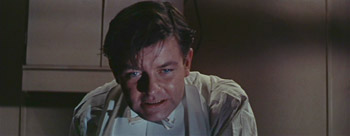 Finally managed a screening of Silent Hill these last fourteen days and have to say that I come away from it well and duly impressed. I was a fan of director Christophe Gans’ Brotherhood of the Wolf - mainly for its sensuality, in hindsight, and its unabashed appreciation of genre in its period action/martial arts machinations. Could be that I liked it more than I should have, but I’ve got the disc filed away next to the Gallic-neo-giallo, Deep in the Woods, nonetheless as modern examples of that peculiarly French predilection for renovating foreign mannerisms with nouvelle French trappings.
Finally managed a screening of Silent Hill these last fourteen days and have to say that I come away from it well and duly impressed. I was a fan of director Christophe Gans’ Brotherhood of the Wolf - mainly for its sensuality, in hindsight, and its unabashed appreciation of genre in its period action/martial arts machinations. Could be that I liked it more than I should have, but I’ve got the disc filed away next to the Gallic-neo-giallo, Deep in the Woods, nonetheless as modern examples of that peculiarly French predilection for renovating foreign mannerisms with nouvelle French trappings. The picture moves – lots of pictures don’t.
I love the way I look at noir after Alphaville; at Hitchcock after Argento; at Ford after Leone.
So I was maybe built-in to give Silent Hill a chance – particularly since I also liked screenwriter Roger Avary’s hyphenate The Rules of Attraction from a couple of years back – but as the picture unspools along its own matriarchal logic: pulses of black, waves, undulations, expansions. . . It’s erotic in its treatment – and I credit Gans with that – and when Alice Krige, as the representative of, perhaps, a patriarchal belief system, is given a rather nasty barbed-wire send-off I recalled, in a perverse way, the means through which the Oracles of Delphi received their divinity.
It’s a smart movie and I disagree that it falls apart on itself because I don’t believe that it takes itself all that seriously. That’s the kind of assessment, though, that’s fraught with subjectivity and I think it might be safer to offer that essaying a video game fright with this level of existential pretension can only be handled with a sense of humor. I point to a trio of baddies, victims we presume of a mining disaster (contemporary! poignant!) in a dead West Virginian mining town, who carry around a canary in a cage with them.
Questions of purgatory/hell and so on are pointless to me in this conversation as I think the film lives or dies on the strength of its images sprung from/steeped in a particular feminine surrealism. There’s a lot of anxiety in this picture (castration and otherwise) – enough so that I wondered for the umpteenth time what people were thinking allowing their three-year-olds to see it at the dollar’s on a sultry, Colorado summer afternoon. At least the question of where all these twisted little kids in films like this come from has a possible solution.
Probably do a proper review one day if/when FFC gets a screener – but preliminaries on it are high positive. It’s better than the mega-blockbusters of the last three weeks, at least, which says little and a lot.
Missed my talk for The Misfits last weekend: a combination of exhaustion and a carburetor over-heating on the drive up I-70 – still emailed my notes and screen-shots to the librarian up there so that the talk could go on without me. Big regrets about that as The Misfits is just awesome. The first scene we get with Montgomery Clift’s rodeo cowboy character has him on a payphone to his mother assuring that his face has completely healed and that she would recognize him now. Devastating stuff and proof, I think, that Marilyn Monroe could have been a contender.
Also presided over a discussion of Aguirre: The Wrath of God which has to be one of the most enjoyable films to talk about with a group of people. The film is molten poetry and its ability to devastate and astonish remains unsullied by time and reputation. My two-hour lecture (with clips) of three early Jack Nicholson pictures went well, too. A busy week – capped by a public screening of X3 wherein all the fanatics sat on their hands and looked at each other throughout. People will go – just as people went to Da Vinci Code - regardless of what anyone says, making my profession in the public conversation exactly moot. You do it for legacy, man, all the rest of it is ash.
The question tickling my ivories: what collaborator, in front or behind of the camera, overshadowed say, like Avary in the Tarantino/Avary collaboration – might have had more to say about the success of certain celebrated projects than initially thought? My first salvo is any good film that Robert Towne wrote. Second is Tippi Hedren in The Birds and Marnie - but that could just be my libido talking.








